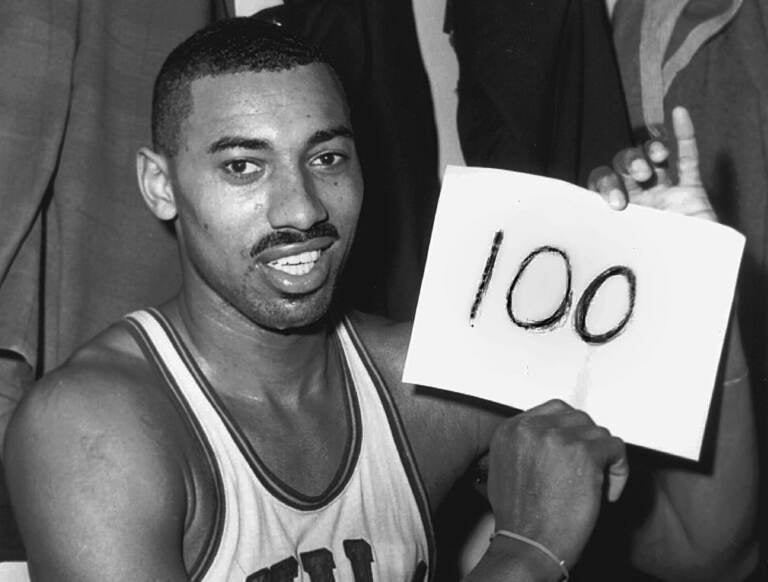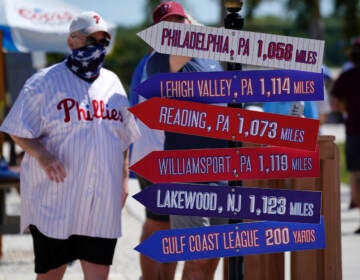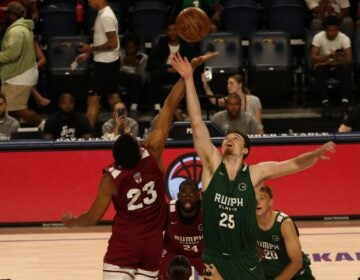‘100 was a monument’: 60 years later, Wilt Chamberlain’s record still inspires awe
On a cold night in Hershey, Wilt Chamberlain did the unthinkable. Amid so many sports records, why does this milestone still resonate?
Listen 5:59
FILE - Wilt Chamberlain, of the Philadelphia Warriors, holds a sign reading "100" in the dressing room in Hershey, Pa., March 2, 1962, after he scored 100 points, as the Warriors defeated the New York Knicks. Wednesday marks the 60th anniversary of the greatest scoring effort in NBA history — 36 field goals, 28 free throws, 100 points for Chamberlain, in the Warriors’ 169-147 win in a game played before about 4,000 people in Hershey. It might be the closest thing the NBA has to a single-game record that will never be broken. (AP Photo/Paul Vathis, File)
There are a lot of records in sports — maybe too many records.
But there are only a few where people actually remember the number involved.
There’s Joe DiMaggio’s 56-game hitting streak. The 4-minute mile.
And then there’s Wilt Chamberlain. On March 2, 1962 — exactly 60 years ago — the legendary Philadelphia Warriors center scored 100 points in a single game.
It’s still the signature record in basketball history. It also helped launch the legend of Wilt — a superstar who would help establish the NBA at a time when its future seemed wobbly.
WHYY host Avi Wolfman-Arent revisited that historic night with sportswriter Gary Pomerantz, the author of “Wilt, 1962: The Night of 100 Points and the Dawn of a New Era.”
The interview below has been condensed and edited for clarity.
—
Let’s start the night before the game. What was Wilt up to?
Well, as Wilt would tell it, the night before the game — as with most nights — he was with a woman. This is the thing about Wilt: He was 7’1”, and he had to be even bigger in the way he told his stories. He had a Goliath syndrome.
When Wilt died, two numbers became the shorthand summary of Wilt’s life: 20,000 and 100. One hundred for the 100-point game in Hershey, and 20,000 for his myth-maker’s boast that he had slept with 20,000 women. Best we can tell — if we are to listen to Wilt’s narration — the night before, that’s what he was doing.
This game was played in Hershey, Pennsylvania, between a team from New York and a team from Philadelphia. Why was this game in Hershey, and what does that tell us about the state of the NBA in 1962?
You must put away any notions of today’s NBA when you consider the 1962 NBA. Now, it’s exploding lights and flash and glamour. Back in 1962, it was more of a lounge act — a league in search of itself, a carnival kind of atmosphere. The crowds were so small — the joke went back then — that P.A. announcers would introduce the starting lineups before the game, and then they would introduce each fan in the crowd because there were so few of them.
But the game was played in Hershey because the league was trying to grow new fans. So that meant the Philadelphia Warriors played three games in Hershey that season because Hershey had a big arena, seating nearly 8,000 fans. The Lakers were playing games in Seattle and in San Francisco. The Boston Celtics played in Providence. This was how the NBA tried to develop its base.
Let’s set the scene a little. It’s a cold Friday night in early March. It’s a pretty big arena, but it’s … half-filled?
Half-filled in the famous chocolate town of Hershey.
Eddie Gottlieb was the owner of the Philadelphia Warriors. Although Gotty — as he was known — was round, his estimates for crowd totals never were because they seemed more realistic. So this [crowd estimate] was 4,124. And that did not include the kids who snuck into the arena in the usual ways.
Wilt was a dominant player, and that season he was particularly dominant as a scorer. But he only scored 100 points once. So what happened on this particular — on the court — that allowed him to reach this unsurpassed peak?
Well, a few things happened off the court that allowed him to reach this unsurpassed peak of 100 points. Most significantly, perhaps, the New York Knicks had two centers — both 6’10”. One, Darrall Imhoff, was a rookie. The other, more experienced player was named Phil Jordon.
Phil Jordon didn’t play that night because he’d gone on a late-night bender the night before and was vomiting in the hotel room in Harrisburg. So that meant that Wilt Chamberlain was matched against Darrall Imhoff.
Imhoff committed six fouls and therefore fouled out of the game after playing just 20 minutes. A basketball game, as you know, is 48 minutes. That means for 28 minutes of that game in Hershey, the tallest player the Knicks had was 6’8” Cleveland Buckner. He was reed-thin [and] no match for Chamberlain.
What’s the scene on the court and in the locker room after the game? This is a half-filled arena. But people are also aware of what just happened. I’m trying to square those two things and picture what it would have felt like.
Well, it was a difficult moment to be an usher. When Wilt hits 100 points, all heaven breaks loose. The kids of the chocolate factory workers in Hershey had lined up three- and four-deep around the court waiting for the moment. The ushers stepped aside, and they were overrun by the kids who ran out to the court to congratulate Wilt.
This game was not televised. It was broadcast on radio. There are some recordings of the fourth quarter. But we don’t have a complete audio or video record of this incredible game. How does that change our relationship to the feat itself?
What we have is the fourth-quarter play-by-play call of WCAU sportscaster Bill Campbell. Wilt scores, and you hear Campbell leaning forward and screaming into his microphone: “He made it! He made it! A dipper dunk! The fans are rushing the floor.”
It’s a wonderful sports moment, and there’s something about radio that TV can’t touch. It’s launched into the imagination. You can’t see it. Your imagination is triggered by it, though. And the game, you know, has been launched into sports mythology. It’s one of the great athletic achievements in sports. It’s the statistical Everest.
Wilt’s 100-point game [also] carries important symbolism. There was a quota in the NBA that owners in the league limited the number of opportunities for Black players to just one or two per team initially, and then three [or] four.
What Wilt did was shatter that quota — the whole notion that this league would be a white man’s enclave. Not anymore.
There is something about this specific record that, for me, goes well beyond sports and goes to math, the base-10 number system. The fact that he scored 100 — not 103 or 99 — has always stood out and imbued [the record] with something I can’t quite put my finger on.
Wilt came with a body and an ego perfectly sculpted for dominating this game. And the ego was essential. For a player to score 100 points in an NBA game, he must not only want to do it, he must on, on a deeper level, need to do it. To take an entire sport and bend it to his will — to show that it could be done, and only by him.
And in the number 100, there was a symbolic magic. In our culture, the number 100 is a century. It’s a perfect score on a test score. Scoring a hundred meant infinitely more than scoring, say, 97 or 103.
A hundred was a monument.
This game happens at a moment when the NBA’s ascendence, dominance is certainly not inevitable. How does this night change the trajectory of the NBA?
Oscar Robertson, the great NBA star, would later say that Wilt saves the league. And I think he’s right. Because it was not a certain future for the NBA. It wasn’t … No one knew if the NBA was going to be launched into the stratosphere, as it has been in the decades that followed.
Fans wanted to see Wilt. They wanted to see the guy who scored 100 points.
The great Boston Red Sox hitter Ted Williams used to say: “When I walk down the street, I want people to point at me and say, `There goes the greatest hitter that ever lived.’”
Wilt did not embrace the 100-point game for decades because he thought it fostered the notion that he was an individualist only interested in his own statistics. But later in life, he realized that when he walked down the street, people would point at him and say, “There goes the guy that scored 100 points.”
WHYY is your source for fact-based, in-depth journalism and information. As a nonprofit organization, we rely on financial support from readers like you. Please give today.






